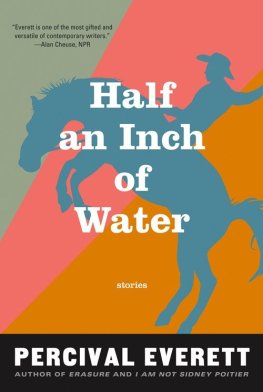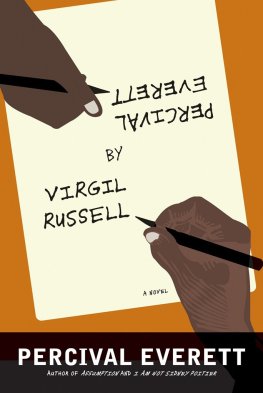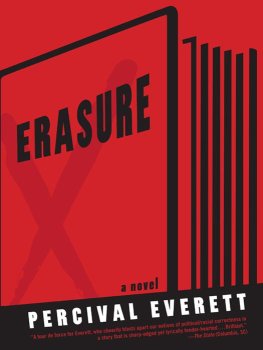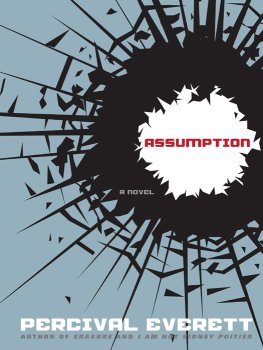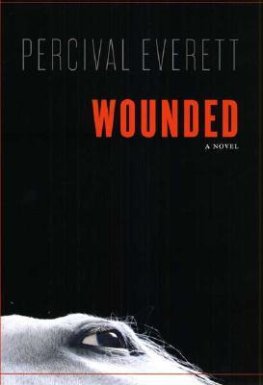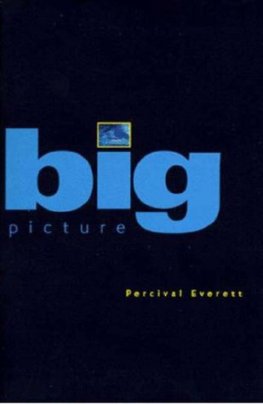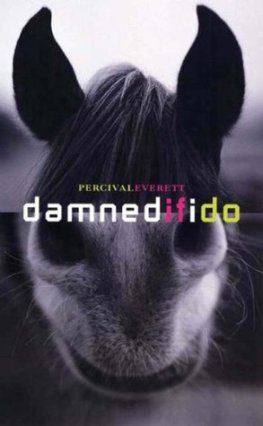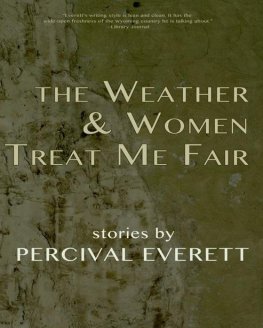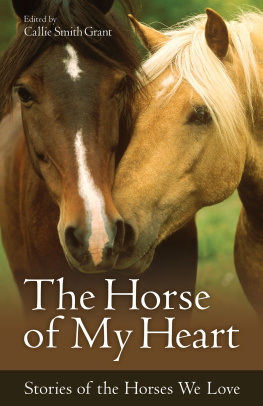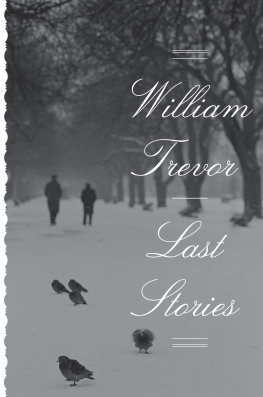Percival Everett
Half an Inch of Water: Stories
A spring-fed creek ran through the ranch and so even in the harshest summer weeks there was a narrow lane of willows and green grass. Moose and elk browsed and left deep tracks in the muddy banks. Sam Innis had grown up there with his mother, his father having died in the war in Vietnam. The woman had clung to her husbands dream, leasing out pasture, raising a few beefs, and giving piano lessons to the ranch children in the valley. She turned down many offers on the place, saying that even imagining such a thing would be a betrayal. Love of the spread had been rubbed into him like so much salve, a barrier against whatever was out there in the world, a layer of peace. His mother held him close, not wanting to lose her only remaining family, but let the ranch, the land, shape him. She let him go for his education and died while he was away at vet school. He had the old woman cremated and her ashes were mixed now into the dusty furrows, mud, and deep tracks of life of that place. At dusk, when the owls and bats were whispering about, Sam would sit by the creek and watch the few trout rise to some hatch.
The desert rolled like always, constant, brown, ocher, and especially red in the distance. The pressure of people, the efforts of people had killed off much of the life, but none of the desert. His mother had said it: you can kill everything, you can tear it all up and build, you can pipe water to it, but the desert is the desert, more desert every day. It unfolded itself before him as he crested the ridge and started down the big curve of highway that would take him to the road to his place. The late- morning sun was still behind him, but the shadows of the sage were beginning to shorten.
Sam and his wife were driving home from a memorial service. The oldest resident of the reservation had died at ninety-two. That was old for anyone, but especially for a Native man. Someone had told Sam that the life expectancy of an Indian male was forty-four. The Indian man who offered the statistic did so without the slightest show of bitterness or even fear. Its just a thing, he said. The service had been at the Episcopal church. Sam didnt like churches.
Sam didnt know what the old mans death had been like. Apparently he was walking one minute and not the next. Sam hadnt known Old Dave Wednesday very well, for only a few years, but once, while Sam was out examining the horses at the tribal ranch, the two sat together on a hillside.
I am an old man, Dave said.
I suppose, Sam agreed. How old are you exactly?
Ninety.
Thats old. My mother didnt live to be that old.
They had hiked up the hill to look down at the ranch. Dave was telling him how the tribe planned to bring water down- mountain via an old-fashioned drainage ditch.
Dave pointed at the hills with an open, shaky hand. From over there. Them surveyors came and looked and said it was possible. Said we need some engineers. And all of them want to get paid.
Sam nodded.
Dave rubbed his knees. Im glad to be sitting. I cant walk like I used to.
None of us can, Sam said.
I will die soon.
Sam was not so comfortable with this talk, but he said, We all die. He hated this platitude.
So Im told. And there is nothing wrong with it. If you do it right, then you dont have to do it again.
They sat silent for a bit. Sam looked at the horses in the pasture below and then over at the hills where the water would come from. Measure twice, cut once, he said.
Dave laughed. Then he laughed again, at something else.
What is it? Sam asked.
Us, the old man said. We are Sam and Dave. We are soul men. He laughed again, louder.
Sam brought the pickup to a stop on the gravel next to the house. He and Sophie sat there for a few seconds and let the ticking of the killed engine settle into silence. They stared ahead at the fenced pasture and the willows far off along the creek. A colt pranced around his mother.
You okay? Sophie asked.
Sam looked at her.
About having been in a church.
Sam chuckled. Yes, Im okay. Lets get changed so we can take care of these beasts.
Zip, the border collie, greeted them at the door and followed them into the house through the kitchen. Sophie stopped at the counter to check the phone messages. Sam walked upstairs, peeled off his jacket, and undid the knot of his tie. He sat on the bed and kicked off his shoes.
These shoes hurt my feet, he said as Sophie entered.
You always say that.
Its always true. You should bury me in them. That way youll know I wont be doing any ghostly walking.
I was looking forward to your ghostly walking.
You are a sweet-talker, arent you?
Yes, I am. She unhooked the back of her dress and let it slide down her body to the floor.
All right. And youre a tease.
Yes, I am.
Come here, Missy. He reached for her hand.
You know I love when you talk cowboy.
Do you now? Come here.
Me?
Yes, you, maam.
He stood and held her, kissed her.
The house shifted, it seemed. Then the whole structure shook, swayed as if riding a wave. They clung to each other. There was a crash downstairs. The clock bounced off Sams nightstand. And it was over and everything was quiet for a brief moment and then the mules were braying and the horses were calling out. Then Zip started barking.
Wow. Sophie dropped to a knee and comforted the dog. Earthquake?
Im guessing so.
Sam slipped back into his dress shoes and headed for the stairs. Sophie grabbed her robe and pulled it on. She followed him down. Sam wondered if there would be another tremor. At the bottom he could see that the framed picture of his mother had fallen, but only the glass had cracked. Other pictures were askew, but nothing seemed to be broken. They stepped into the mudroom and changed into their boots, then walked out the kitchen door. The world didnt appear any different. The sky was cloudless. The hills were still standing in the distance. Zip ran in circles. The horses were stirred up. The skittish mare was kicking her stall wall in the near barn. A loose barn door that Sam had been meaning to repair for weeks now lay flat in the dust.
You go settle the horses, Sam said. Ill check the propane.
Sam watched Sophie move off. She stopped to say something soft to the little donkey in the paddock just outside the barn. Zip stayed with Sam. She always stayed with Sam. He went to the cabinet on the exterior wall next to the back door and grabbed a pipe wrench and a spray bottle filled with soapy water. The large green propane tank was thirty yards from the house. It looked fine. He listened as he looked at the gauge and felt around the joins. He sprayed the connections and saw no bubbles. The line to the house was underground; there was no checking that. He walked back to the house and into the kitchen. He pushed the stove away from the wall and bit and sprayed the line, all good. In the cellar he checked the furnace. The pilot was surprisingly still lit. No leaks. Same with the water heater. Sophie was in the kitchen when he came back up.
Everything all right? she asked.
All good.
I cant believe we had an earthquake. She sat at the table. I didnt even know we had a fault.
You dont, Sam said.
Whos the sweet-talker?
The barns?
Just that door. Horses are scared.
Horses are always scared. Theyll be fine in ten minutes. Sam set the spray bottle on the table. I guess we should turn on the radio.
They sat in the kitchen, drank tea, and listened to the local station. There had been a quake, the magnitude of which had not been determined, a surprise to everyone and a source of incessant chatter. There was little to report in the way of damage and they quickly grew tired of people calling in to repeat the experience of the previous caller. Broken canned goods, cracked washer drums, ruined china sets. One woman called to say that in the minutes right before the quake her chickens, to a hen, had laid an egg.

